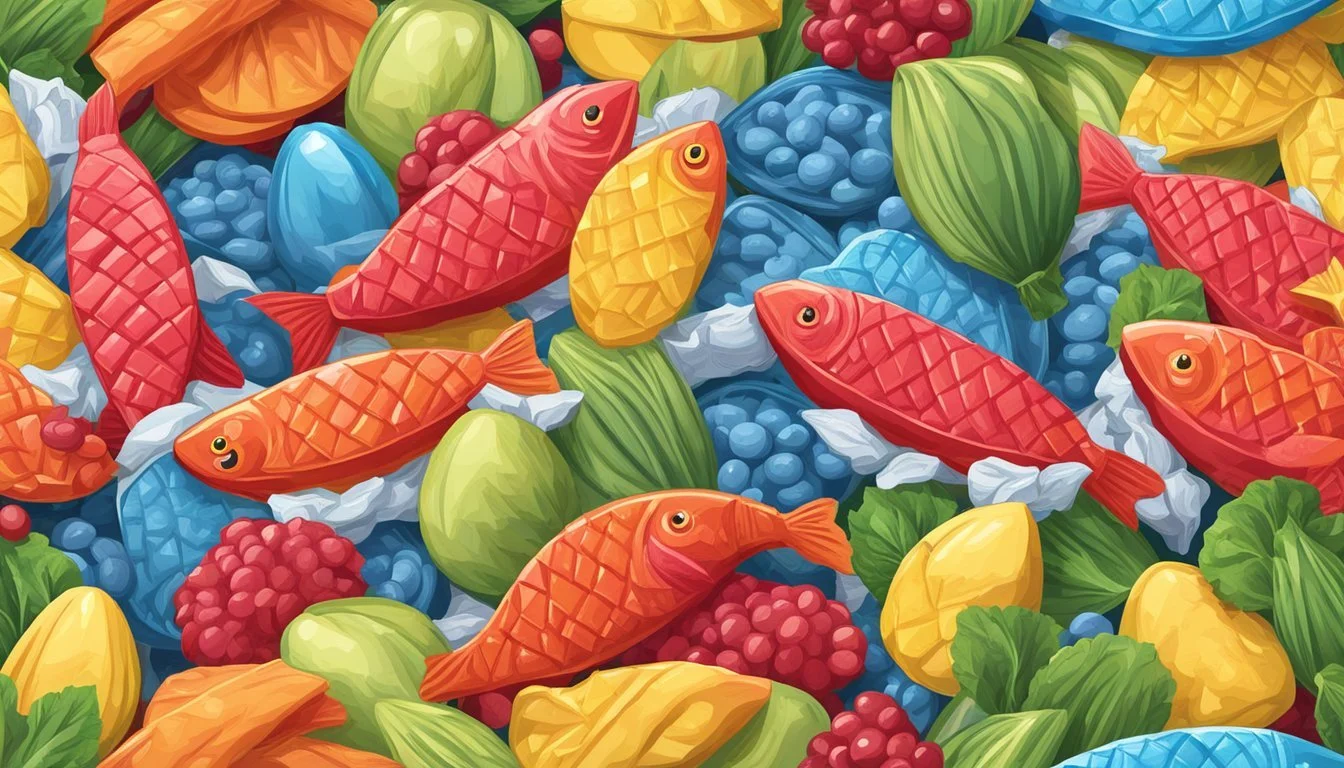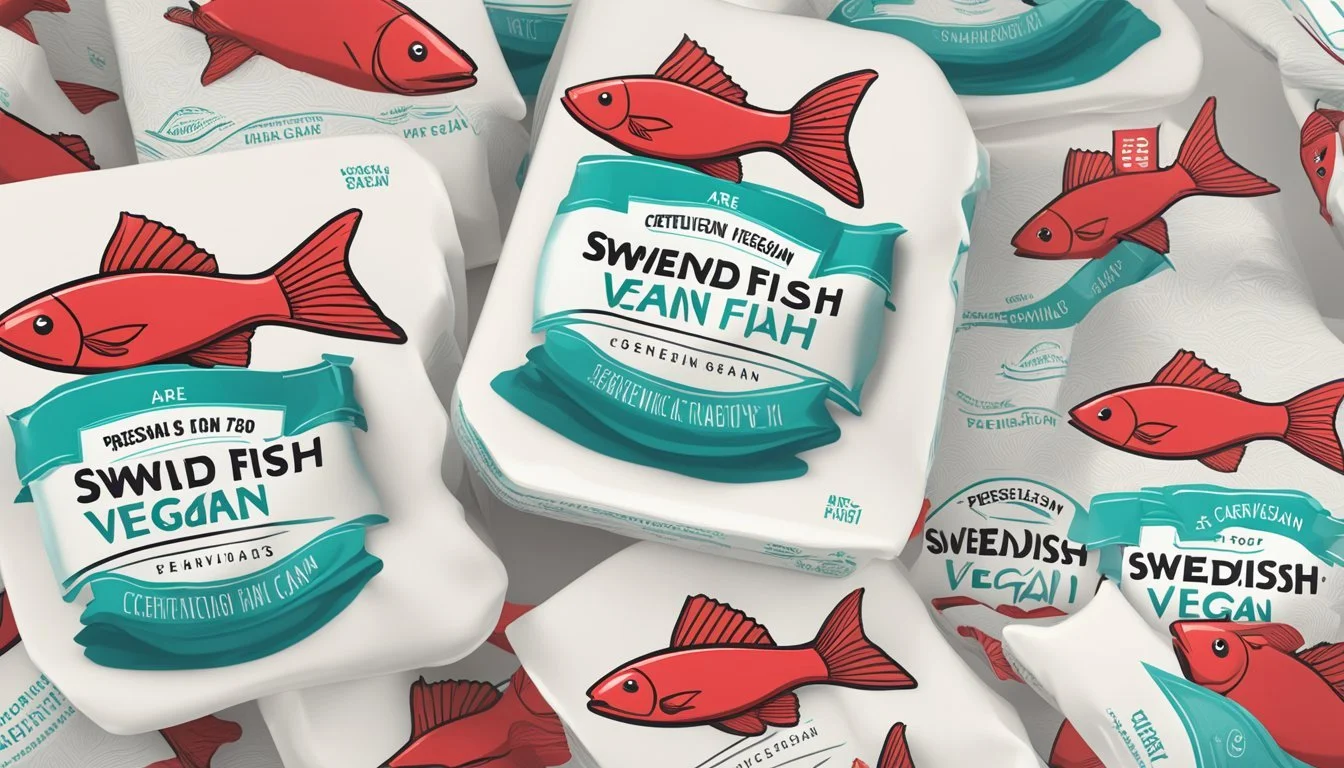Are Swedish Fish Vegan?
Unraveling the Snack's Ingredients
Swedish Fish, the cherished gummy candy known for their unique chewiness and sweet flavor, have been a subject of interest within the vegan community. Veganism, which excludes all forms of animal exploitation and cruelty as far as possible, extends to diet where only plant-based foods are consumed. Considering that gelatin, often derived from animal by-products, is a common ingredient in gummy candies, consumers who adhere to a vegan diet frequently scrutinize candy ingredients to ensure they align with vegan principles.
The composition of Swedish Fish has been assessed to determine their suitability for a vegan diet. These candies do not list gelatin among their ingredients, making them a potential vegan-friendly option. Instead of animal-based gelatin, they utilize alternative plant-derived substances to achieve their distinctive texture. Additionally, the sugar used in Swedish Fish originates from plants, adding another layer of assurance for those following vegan dietary guidelines.
Despite the absence of gelatin, some concerns have been raised about other ingredients used in Swedish Fish that might conflict with stricter interpretations of veganism. Ingredients such as sugar, which can be processed with animal bone char, and certain food colorings or additives, might be contentious in the vegan community. Thus, while Swedish Fish may be considered vegan by some standards, the debate on their vegan status demonstrates the complexity and varied perspectives within vegan dietary practices.
What Are Swedish Fish?
Swedish Fish are a distinctive type of soft, chewy candy known for their sweet flavor and fish shape. They have become a popular snack not only in Sweden but around the world.
History and Origin
Swedish Fish were first developed in the late 1950s by the Swedish company Malaco. Originally created as a wine gum candy, these sweets quickly gained popularity due to their unique fish shape and fruity taste. They were aimed at the international market—primarily North America—where they became a successful export for Sweden.
Popularity in Sweden and Abroad
In Sweden, Swedish Fish are a nostalgic confectionery item, representing a quintessential Swedish snack. Abroad, particularly in North America, Swedish Fish enjoy widespread popularity and are commonly found in various retail locations including gas stations, movie theaters, and grocery stores. Their distinctive flavor and gelatin-free recipe have resonated with a broad audience, contributing to their status as a beloved treat across different age groups.
Veganism and Diet
When discussing if Swedish Fish are vegan, it's essential to understand what veganism entails and how it impacts dietary choices. Veganism is more than a diet; it's a lifestyle choice that influences various aspects of consumption and living.
Defining Veganism
Veganism is a dietary and lifestyle philosophy that excludes all forms of exploitation of, and cruelty to, animals for food, clothing, or any other purpose. Individuals adopt veganism for various reasons, including health concerns, ethical values, sustainability, and environmental impact.
Ethical values: Vegans avoid animal-derived products to promote animal welfare.
Health: Some choose veganism for potential health benefits.
Sustainability: A plant-based diet can be more environmentally sustainable.
Environmental impact: Reducing the carbon footprint associated with animal farming.
Dietary Preferences and Restrictions
Vegan diets exclude all animal products, such as meat, dairy, eggs, and honey. Individuals following a vegan diet choose alternatives that are plant-based and free from animal derivatives.
Plant-based alternatives: Include vegetables, fruits, grains, nuts, and seeds.
Common dietary restrictions: No gelatin, beeswax, or other animal-derived additives.
It's crucial for a food item, like Swedish Fish, to align with these dietary preferences and restrictions to be considered vegan. The presence or absence of ingredients such as gelatin or beeswax is a determining factor.
Ingredients in Swedish Fish
When investigating if Swedish Fish are vegan, one must examine the candy's composition. Two crucial subcategories to consider are the common ingredients used in their production and potential ingredients that might conflict with vegan standards.
Common Ingredients
Swedish Fish typically contain the following components:
Sugar: Often derived from sugar beets or sugarcane.
Corn Syrup: A sweetener made from corn starch.
Modified Corn Starch: Used to provide texture and thickness.
Citric Acid: Adds a tangy flavor and serves as a preservative.
Natural and Artificial Flavors: These enhance the candy's taste.
Colors: Various food colorings give Swedish Fish their distinctive appearance.
Potential Non-Vegan Ingredients
Swedish Fish may contain ingredients of concern for vegans:
Beeswax: Sometimes used as a coating, beeswax is an animal-derived ingredient.
Bone Char: A decolorizing filter that can be involved in sugar processing.
Food Coloring: Certain food colors may be tested on animals or have animal origins.
One particular point of interest is the absence of gelatin, an animal-based gelling agent often found in gummy candies, which is not used in Swedish Fish, making them a potential vegan option barring the non-vegan ingredients listed.
Swedish Fish and Veganism
Swedish Fish, the popular chewy candy, has garnered attention in vegan circles due to its ingredient list, which does not include gelatin, a common non-vegan additive. However, the vegan status of Swedish Fish is not without controversy.
Are They Vegan Friendly?
Swedish Fish are generally considered vegan because they do not contain gelatin or other obvious animal-derived ingredients. This distinction makes them suitable for individuals following a vegan or vegetarian diet. However, some flavors might contain different ingredients, so it is advisable to check the packaging for the most accurate information.
Ingredients typically found in Swedish Fish that suggest they are vegan:
No gelatin
No animal-derived ingredients
Use of carnauba wax, a plant-based alternative to beeswax
Controversies and Debates
The debate surrounding the vegan credentials of Swedish Fish arises due to certain ingredients that are questionable on ethical grounds:
Palm Oil and Palm Kernel Oil: While plant-based, the production of these oils is associated with environmental harm and animal habitat destruction. Ethically-conscious consumers might avoid products with these ingredients.
Carnauba Wax: Though plant-based, the process of harvesting carnauba wax can sometimes be considered exploitative of workers.
The term "cruelty-free" is also part of the broader discussion, encompassing not just the presence of animal products but the ethical implications of the entire production process, from sourcing to manufacturing. Because of these complexities, some individuals regard Swedish Fish as a product that could align with a vegan lifestyle, while others argue that the associated controversies place it outside the bounds of strict veganism.
Health and Nutrition
When evaluating the health and nutrition of Swedish Fish, one must consider both their nutritional profile and any health concerns that are commonly associated with consuming candies.
Nutritional Profile
Swedish Fish typically consist primarily of sugar, with fructose and glucose being key components. Their fruity flavor is derived from artificial and natural flavorings. Here is a basic nutritional breakdown of Swedish Fish:
Calories: Varies per serving size
Sugars: Comprised mostly of sugars
Sodium: Minimal to none
Fat: Fat-free
Protein: Not a significant source
Health Concerns Associated with Candies
Consumption of candies such as Swedish Fish may be linked to various health concerns. The high sugar content can contribute to:
Obesity: Excessive sugar intake can lead to weight gain.
Dental Health: Sugars can be detrimental to dental health, promoting tooth decay.
Cancer Risks: While there’s no direct link between candies and cancer, a diet high in sugar may indirectly increase the risk by contributing to obesity, a known risk factor for several types of cancer.
Swedish Fish are neither labeled as natural nor organic. Consumers looking for such qualities might need to explore other candy options. It is important for consumers to moderate their intake of candies like Swedish Fish as part of a balanced diet.
Vegan Alternatives to Swedish Fish
For those looking to adhere to a vegan diet or seeking cruelty-free alternatives to Swedish Fish, there are a variety of plant-based candy options and recipes to explore that do not compromise on taste and texture.
Plant-Based Candy Options
Sour Patch Kids: These candies provide a similar chewy texture to Swedish Fish and are free of animal-derived ingredients. They are coated in sugar and offer a sour, fruity flavor.
Jelly Beans: Specific brands offer vegan jelly beans that are gelatin-free and use plant-based colorings. It is important to check labels, as not all jelly beans are vegan.
Gummy Candies: A range of gummy candies made with pectin instead of gelatin are available on the market, ensuring a vegan-friendly choice. Pectin is a fruit-derived substance that gives a similar chew as gelatin.
Gummy Bears: Vegan gummy bears are also an alternative, coming in various fruit flavors. They replace gelatin with substances like agar-agar, a seaweed-based gelling agent.
Homemade Vegan Candy Recipes
Recipes offer control over the ingredients, ensuring they align with vegan standards. Here are two simple recipes:
Fruit Gummies: By using pectin and pureed fruits, one can create homemade gummy candies that are both vegan and reflect the natural sweetness and tanginess of fruits.
Vegan Swedish Fish: A recipe can be formulated with vegan gelatin substitutes and natural flavorings to mimic traditional Swedish Fish while remaining completely plant-based.
Ethical and Environmental Considerations
When considering whether Swedish Fish are vegan, it is crucial to explore how candy production affects animal welfare and the environmental impact of ingredients used.
Candy Production and Animal Welfare
The production of vegan candies like Swedish Fish is significant from an ethical standpoint as it avoids the use of animal-derived gelatin—a common candy ingredient that raises concerns about animal welfare. Without gelatin or other animal products, the making of these candies ensures that they adhere to vegan principles, which include the avoidance of animal testing and exploitation.
Environmental Impact of Ingredients
The sustainability and environmental impact of ingredients in candy production also factor into assessing the viability of Swedish Fish as an ethical choice. For instance, the use of carnauba wax—sourced from the leaves of the carnauba palm—is environmentally pertinent, as this wax is plant-derived and considered a more sustainable option. Conversely, ingredients that are petroleum-derived, such as artificial colors, can be of concern due to the environmental cost of petroleum extraction and processing.
Labeling and Certification
In the context of vegan consumers assessing candies like Swedish Fish, labels and certifications provide essential information regarding ingredients and manufacturing processes. These elements help determine whether a product meets vegan standards, which exclude all animal products and by-products.
Understanding Food Labels
Food labels serve as a guide for consumers to understand what ingredients are in a product and how it's made. Vegan labeling on food products, including candy, means that the item should not contain any animal-derived ingredients, such as gelatin, which is commonly used in gummy candies. Instead, manufacturers may use alternative gelling agents like pectin or starches. Gluten-free and organic claims may also be present, though they do not necessarily align with vegan standards, as gluten-free refers to the absence of certain grains and organic refers to farming practices that exclude synthetic pesticides and fertilizers. It is important that consumers read labels carefully, as some ingredients might not be outright non-vegan, but their sourcing or processing could raise concerns within the vegan community.
Candy Certifications
Candy certifications can offer an additional level of assurance for consumers. They involve a third-party verification to ensure that the candy, such as Swedish Fish, adheres to certain standards, including vegan and potentially gluten-free or organic specifications. A common certification is Vegan-Certified, indicating a product is free from animal-derived ingredients and cross-contamination during production. These certifications are especially valuable to consumers who rely on strict dietary standards for ethical, health, or religious reasons. Certifications are displayed via specific logos or statements on packaging, and while not all vegan products are certified, the presence of such a mark is a quick indication of a product's compliance with vegan criteria.





